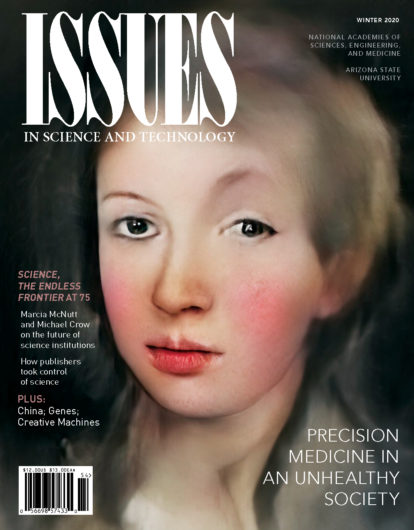CSPO News
Winter 2020 Issues in Science and Technology
Authors in the latest issue reimagine science institutions, discover the hidden influence of academic publishers, warn against the claims of precision medicine, and much more.
 Science, the Endless Frontier is the policy document that provided the blueprint for public investment in scientific research in the United States for the past 75 years. Its influence on science policy would be difficult to overstate, and the research enterprise it helped produce remains one of the world’s most powerful and productive.
Science, the Endless Frontier is the policy document that provided the blueprint for public investment in scientific research in the United States for the past 75 years. Its influence on science policy would be difficult to overstate, and the research enterprise it helped produce remains one of the world’s most powerful and productive.
But two essays in the Winter 2020 Issues in Science and Technology—the first in a year-long series of articles on the anniversary of Science, the Endless Frontier—reassess the legacy of this report and argue that the time has come to put science policy on a firmer footing in order to confront the challenges of the twenty-first century:
- Marcia McNutt, president of the National Academy of Sciences, and Michael Crow, president of Arizona State University, describe the need for scientific institutions to move beyond the limits imposed by the post-World War II approach to organizing science.
- Mark Neff examines an unintended consequence of scientific self-governance. Much of that governance was handed over to scientific publishers, and the profit motive of these increasingly powerful companies has become a potent but hidden influence on the directions and priorities of science.
Also in this issue:
- Richard Cooper and Nigel Paneth cast a critical eye on the promise of precision medicine. Although the idea, now dominant in biomedical research, that genomics will provide more effective, personalized treatment for disease is appealing, it may actually be pushing science dangerously far from proven pathways to improved public health.
- When a creative machine produces a work of art, who should benefit? Developments in artificial intelligence are leading to a new era of innovation and creativity. Deepak Somaya and Lav R. Varshney argue that intellectual property rights are falling behind.
- The chancellor of the North Dakota University System, Mark Hagerott, makes the case that the opportunities of the digital revolution can be more equitably distributed through a new digital-cyber land grant university system. He’ll be discussing these ideas at an event we’re cohosting in Washington, DC, on February 5.
- China’s rise as an innovation giant: Carolyn Bartholomew warns that Beijing’s techno-nationalist approach to digital innovation, such as 5G cellular networks, puts the United States at a disadvantage, with serious ramifications for economic, military, and political security. Richard P. Suttmeier finds that US efforts to decouple from China’s innovation system could backfire, making China more independent and more capable.
And much more, including book reviews, letters, and artwork.